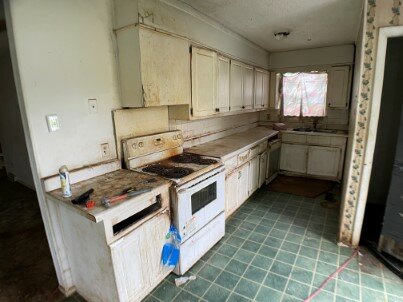
Cash offers have always been around in real estate, but they have exploded in the last few years with the emergence of iBuyers, hedge funds, and prospective homeowners just trying to get a leg up on the competition.
But what does a cash offer on a house mean exactly? It can certainly simplify the process of selling a house, but there are also a few misconceptions surrounding them.
In this article, we’ve broken down what they are and aren’t, as well as the pros and cons of a cash offer on a house.
If you’re looking to sell a house soon or just want to better understand the real estate market, keep reading, and we’ll help you get there!
Definition of a Cash Offer
A cash offer in real estate is an offer to buy a house without a financing contingency.
That’s all it means. So I guess we can end the article here…
But you probably want more information than that, right? So let’s keep going.

Inspection Contingency
Most real estate contracts contain multiple contingencies that allow the buyer to back out of the deal and get their earnest money back if specific stipulations aren’t met. One of these contingencies is an inspection contingency. This gives the buyer the right to perform their due diligence on the property, including a professional home inspection. If issues with the house come up on the inspection report and the seller is unwilling to fix them, the buyer can back out of the deal.
Financing Contingency
When there is a mortgage lender involved with the purchase of a house, the contract will typically include a financing contingency that specifies that the transaction is contingent upon the buyer’s ability to get a loan. Not only that, but many financing contingencies set the maximum interest rate the buyer is obligated to get on their loan. If they cannot get a loan at or below this interest rate, they have the right to cancel the contract.
Because no lender is involved with a cash sale, this contingency is not included in the contract, thereby increasing the likelihood of successfully getting to the closing table.
Appraisal Contingency
Although they are two separate things, financing and appraisal contingencies are closely related. In financed purchases, mortgage lenders will order an appraisal of the property to verify its value. If the home’s appraised value is less than the purchase price, the lender will not be willing to approve the loan.
Technically the buyer could back out at this point, but that’s not always what happens. Often, either the buyer will make up the difference with a larger down payment, or the seller will lower the sales price to the appraised value.

Misconceptions About Cash Offers
As we’ve discussed, a cash offer on your house simply eliminates the financing contingency from the contract, which can undoubtedly be a great incentive. However, there are many misconceptions surrounding cash buyers. For example, buyers that pay cash for houses don’t bring a briefcase full of hundred dollar bills to the closing table. They wire transfer the money in just like any other buyer.
What are some other things that aren’t always included in a cash offer?
Does A Cash Offer Mean No Inspections?
Definitely not. Although many cash buyers such as real estate investors often buy houses as-is and even waive inspection contingencies, this benefit is not included in every cash offer. A cash buyer can still include an inspection contingency. If it does, the buyer has the right to back out or request repairs during their due diligence period.
Does A Cash Offer Mean As-Is?
Not necessarily. Once again, it depends on what is in the contract. Many cash deals are intended to be as-is sales, meaning the buyer will not ask the seller to make any repairs. However, even as-is sales often include an inspection contingency. Even though the buyer does not plan to request repairs from the seller in this case, they still might back out of the deal or ask for a lower price if significant issues arise on the inspection report.
Does A Cash Offer Mean No Appraisal?
Usually, but not always. While most appraisals are part of the mortgage underwriting process when the buyer is getting a loan, some cash buyers might insist on getting an appraisal to verify the house’s value. However, most cash offers do not require an appraisal. Real estate investors typically run their own analysis to determine what a house is worth, so an appraisal is unnecessary.
Does A Cash Offer Mean A Guaranteed Sale?
As real estate investors, we’ve learned to never start counting the proceeds from a house sale until you have the check in hand from closing.
As we’ve already mentioned, there is a variety of different contingencies that allow the buyer to back out of a cash deal. Also, technically a buyer can back out of a cash sale without using a contingency, but in this case they would forfeit their earnest money deposit.

What are the Pros and Cons of a Cash Offer on a House?
Aside from removing buyers’ ability to back out of the purchase because they can’t get approved for a loan, there are many benefits that cash sales offer home sellers. Let’s take a look at what these are.
A Fast and Simple Transaction
For most real estate deals, the loan origination process is what takes the longest amount of time. That is why most financed purchases take between 30 and 45 days to close. Cash sales can often close much faster than this. The timeline typically depends on the title company handling the closing, but it can sometimes be within 7-10 days.
On top of the speed of a cash purchase, the process is typically much simpler. Lenders often require rigorous appraisals and inspections, and these are often eliminated or at least minimized with an all cash offer.
Allows the Sale of a House in Disrepair

Most lenders will not approve a loan on a house with major issues. This is where cash offers shine because they bypass the entire loan approval process.
Even minor issues can derail the process if the buyer is getting an FHA or VA loan, which are very common because they allow the buyer to make a smaller down payment. The lenders on these types of loans can be very picky about the home’s condition.
If you have a house that needs repairs, a cash sale is likely your best bet to get it sold.
Is There Any Downside to a Cash Offer?
The only time a cash offer does not make sense is when you are selling a home in excellent condition and are looking for the highest price possible. In this case, a financed buyer will likely be willing to pay more than a cash buyer.
Need a Cash Offer on Your Home?
If you need to sell a house in Huntsville or the surrounding areas and want a quick and simple solution, we are local home buyers that will help you out!
If you’re looking for a cash purchase, we’ll make that happen. We also cover all of the closing costs when we buy a house. Not only that, but you won’t have to worry about paying real estate agent fees when selling to us.
We specialize in buying and renovating houses, so don’t worry if your home needs any level of repairs. We’ll take it just like it is and allow you to forget about it!
